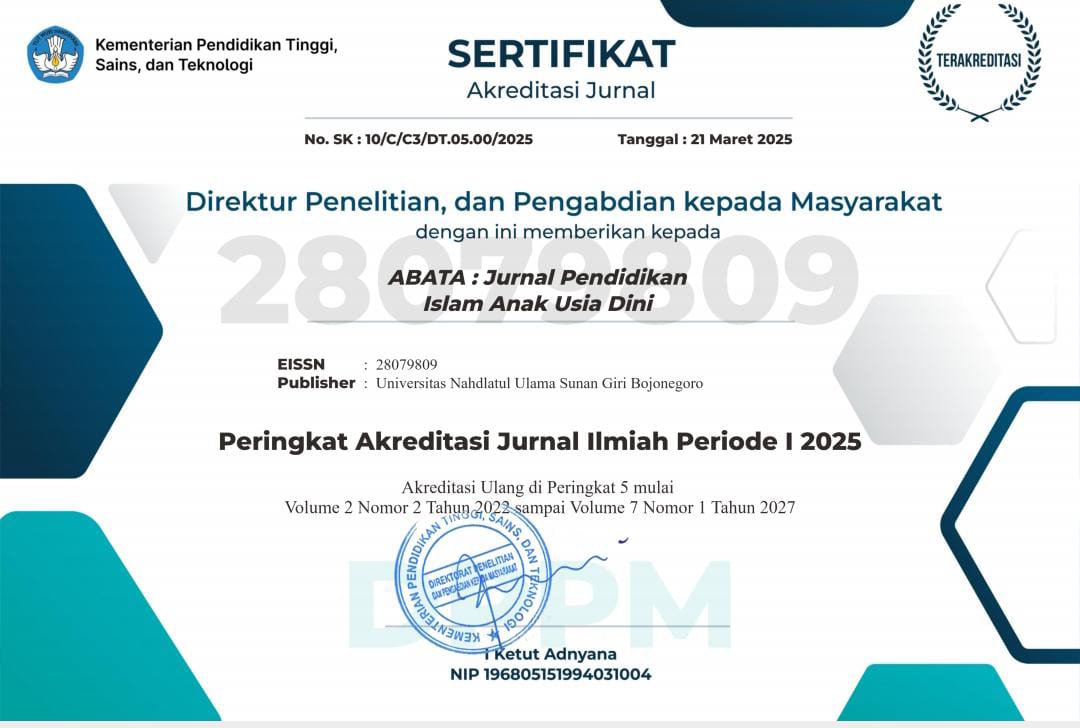PENERAPAN PERMAINAN “ SMART EGG PUZZLE ” DALAM MENINGKATKAN PERILAKU PROSOSIAL ANAK USIA DINI

DOI:
https://doi.org/10.32665/abata.v1i1.239Keywords:
Smart egg puzzle game;, Social behavior;, Early childhood;Abstract
The purpose of this study was to determine the effect of the application of the smart egg puzzle game on the social behavior of early childhood. This research was conducted in TK intan Berlian Lamongan with a total sample of 35 children. This study uses a quantitative approach. The research design in this study uses a quasi-experimental research design, where this design has a control group but does not fully function to control external variables that affect the implementation of the experiment. In this study, a nonequivalent control group design was used, where the experimental group and the control group were not chosen randomly. The indicators of this research are being cooperative, expressing emotions according to existing conditions and sharing with others. The results showed that the smart egg puzzle game had a significant effect on understanding the concept of geometry and social behavior in children aged 5-6 years at Intan Berlian Kindergarten. The t-test proves that the value of sig. Levene's Test for Equality of Variances is 0.221, greater than 0.05, it means that H0 is rejected and Ha is accepted. Thus it can be concluded that there is a significant difference between the experimental group and the control group
References
Ayu, S. (2014). Segudang game edukasi mengajar, macam-macam game untuk mengajar. Yogyakarta: Diva Press
Beaty, J. (2013). Observasi perkembangan anak usia dini edisi ketujuh. Jakarta: PT. Fajar Interpratama Mandiri
Clark, C. D. (2018). Play. Rutgers university, Camden, NJ, United States Reference module in neuroscience and biobehavioral psychology. doi:10.1016/B978-0-12-809324-5.21792-6
Creswell, J.W. (2013). Research design qualitative, quantitative, and mixed methods approaches. Sage Publications. Inc
Fernandez, C., Yomogida, M., Aratani, Y & Hernandez, D. (2017). Dual food and energy hardship and associated child behavior. Academic pediatrics. doi:10.1016/j.acap.2018.07.002
Gita, D.Y. (2017). Pengaruh permainan puzzle terhadap perkembangan kognitif anak usia 5-6 tahun di TK negeri pembina Manyaran tahun ajaran 2016/2017.Naska Publikasih. (diakses 15 januari 2019)
Gozzi, R.Jr. (2014). The jigsaw puzzle as a metaphor for knowledge. United States: International Society for General Semantics.
Irene C.M., Giofrè D & Caviola, S. (2017). Learning geometry: the development of geometrical concepts and the role of cognitive processes. Acquisition of complex arithmetic skills and higher-order mathematics concepts pages 221-246. doi:10.1016/B978-0-12-805086-6.00010-2
Jackman, H.L. (2012). Early education curriculum: a child’s connection to the world, fifth edition. Canada: Wadsworth, Cengage Learning,
Jannah, M. (2016). Psikologi eksperimen sebuah pengantar. Surabaya: UNESA University Press
Jeona, l., Buettnerb C. K., Granta, A & Lang, S.N. (2018). Early childhood teachers' stress and children's social, emotional, and behavioral functioning. Journal of applied developmental psychology. doi:10.1016/j.appdev.2018.02.002
Joseph, F., Hair, Jr., William, C., Black Barry J,. Babin R.E,. Anderson. (2014). Multivariate data analysis seventh edition. Pearson Education Limited ISBN 10: 1-292-02190-X ISBN 13: 978-1-292-02190-4
Latif, M., Zukhairina. Zubaida, R., Afandi, M. (2013). Orientasi baru pendidikan anak usia dini teori dan aplikasi. Jakarta: Kencana Prenada Media Group
Lucas, F.M.M. (2017). The game as an early childhood learning resource for intercultural education. Procedia-social and behavioral sciences. doi:10.1016/j.sbspro.2017.02.127
Mulyasa. (2014). Manajemen PAUD. Bandung: PT Remaja Rosdakarya
Mursid. (2016). Pengembangan pembelajaran PAUD. Bandung: PT Remaja Rosdakarya
Pavlovicova, G & Zahorska, J. (2015). The attitudes of students to the geometry and their concepts about square. Procedia-social and behavioral sciences. doi:10.1016/j.sbspro.2015.07.253
Purwanto. (2012). Metodologi penelitian kuantitatif untuk psikologi dan pendidikan. Yogyakarta: Pustaka Pelajar Offset
Sari, Y.K. (2018). The effect of geometric puzzle game towards children’s recognition of geometric shapes and fine motor. Advances in Social Science, Education and Humanities Research, volume 212
Schaik, J.E.V & Hunnius, S. (2016). Little chameleons: The development of social mimicry during early childhood. Journal of experimental child psychology. doi:10.1016/j.jecp.2016.03.003
Stepletona, K., Boska, E.A, Jacquelynn, F., Durona., Greenfielda, B., Ocasioa, K., Michael J & MacKenzie. (2018). Exploring associations between maternal adverse childhood experiences and child behavior. Children and Youth Services Review. doi:10.1016/j.childyouth.2018.10.027
Sugiyono. (2016). Metode penelitian kuantitatif, kualitatif, dan R&D. Bandung: Alfabeta,
Susanto, A. (2011). Perkembangan anak usia dini pengantar Padaberbagai aspeknya. Jakarta: Kencana Prenada Media Group.
Turney, K & Lanahan, S. (2015). The academic consequences of early childhood problem behaviors. Social science research. doi:10.1016/j.ssresearch.2015.06.022
Yulianti, R. (2012). Permainan yang meningkatkan kecerdasan anak. Jakarta: Lancar Aksara.
 pdf Download: 773
pdf Download: 773















